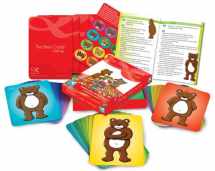
The Bear Cards Feelings
ISBN-13:
9780980517521
ISBN-10:
0980517524
Edition:
2nd edition
Author:
John Veeken
Publication date:
2012
Publisher:
Qcards
Format:
Paperback
FREE US shipping
Book details
ISBN-13:
9780980517521
ISBN-10:
0980517524
Edition:
2nd edition
Author:
John Veeken
Publication date:
2012
Publisher:
Qcards
Format:
Paperback
Summary
The Bear Cards Feelings (ISBN-13: 9780980517521 and ISBN-10: 0980517524), written by authors
John Veeken, was published by Qcards in 2012.
With an overall rating of 3.6 stars, it's a notable title among other
books. You can easily purchase or rent The Bear Cards Feelings (Paperback) from BooksRun,
along with many other new and used
books
and textbooks.
And, if you're looking to sell your copy, our current buyback offer is $3.89.
Description
The Bear Cards are a high quality set of feelings cards used by thousands of teachers and therapists around the globe to assist children with recognising, accepting and, ultimately, expressing their feelings in healthy ways. The Bear cards differ from many other feelings cards in that they show the full body language and not just facial expressions for each feeling. Most children readily identify with the 48 bear characters who are free of gender, age or ethnicity. The enclosed booklet provides a many engaging games and activities suitable for individuals and groups. The qcards website provides more ideas in areas dedicated to teachers, therapists and parents. Each set of cards contains a sticker sheet with a special passkey to download many useful, printable support materials. The key benefits of using The Bear Cards include: • Making conversations about feelings, even the difficult ones, much easier. • Assisting children to identify their own feelings using visual cues. • Building on a child's 'feelings vocabulary' and their ability to describe feelings. • Improving a child's ability to recognise, accept and express their feelings in healthy ways. • Enhancing empathy and interpersonal skills. • Improving individual and group behaviours. The above points are the building blocks to improving a child's Emotional Intelligence (EI). EI is widely regarded as more important than intellectual or academic intelligence in attaining success and well being in later life.


We would LOVE it if you could help us and other readers by reviewing the book
Book review

Congratulations! We have received your book review.
{user}
{createdAt}
by {truncated_author}


